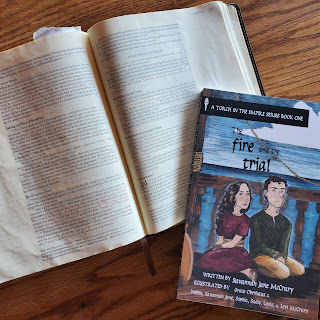5 Tips for Writing Biblical Fiction
Hi friends! You may already know that I have
written two books in a series set in the first-century Roman Empire (The Fire and the Trial and More Sure than the Sun). These books
weave together fictional characters and events with real historical ones,
including some from the Bible. This type of story is often called Biblical
fiction. Today I’d like to share with you some of my tips for writing Biblical
fiction. Whether you’re writing a Biblical fiction novel, short story, or
reviewing one that someone else wrote, I hope you find these tips helpful.
1. Make
the Bible your primary source.
Remember
that the Bible is your only 100% reliable source. Over and over again, the Bible
claims to be the inspired, infallible Word of God. 2 Timothy 3:16-17 says, “All Scripture is given by inspiration of
God, and is profitable for doctrine, for reproof, for correction, for
instruction in righteousness, that the man of God may be complete, thoroughly
equipped for every good work.” The Bible equips us for every good
work—including writing. Measure everything else you read against the Bible. And
when writing your story, don’t change the facts in the Bible. Yes, add fiction,
but don’t stray from what the Bible clearly says. I’ll give you a couple of
examples. The movie Risen tells the
story of a Roman tribune commissioned by Pontius Pilate to search for the body
of Jesus when the tomb is found empty. The Bible doesn’t say that this
happened, but it certainly could have. This is an example of adding fiction
without changing what the Bible says. On the other hand, the movie Exodus: Gods and Kings depicts a
messenger of God appearing to Moses in the form of a young boy, whereas the
Bible clearly states that God spoke to Moses from a burning bush. This is an
example of deliberately changing the story from what the Bible records, and
that’s unacceptable. So when writing your story, make sure you know what the
Scriptures really say. Don’t just go off what you’ve seen in movies. However, I
will add that there are times that I see a movie and I think, “Was it really that way in the Bible? I
don’t remember that.” But then I go back and read the Biblical account and
find that the movie actually did get it right. It’s very important to study,
study, and study the Bible.
2. Look
for other reliable resources.
Even though the Bible should be your primary source, I find it helpful to use a variety of other resources, too. Study Bibles and Bible study companion books can be quite beneficial (I’ve utilized the MacArthur Study Bible and The Victor Journey through the Bible while writing my Biblical fiction). I try to be careful when using the internet for research. Anyone can say anything online, so I look for articles that cite their sources, and I trust something more when they reference ancient documents and the works of notable historians. I also try to find several sources that state the same fact before accepting it as true (if it’s not mentioned in the Bible). If several articles or books all say the same thing, it seems more likely to be true than if I only find one article or book that says it, and other sources say something different. I also love looking at photos of the locations I’m writing about and watching documentaries and educational videos.
Even though the Bible should be your primary source, I find it helpful to use a variety of other resources, too. Study Bibles and Bible study companion books can be quite beneficial (I’ve utilized the MacArthur Study Bible and The Victor Journey through the Bible while writing my Biblical fiction). I try to be careful when using the internet for research. Anyone can say anything online, so I look for articles that cite their sources, and I trust something more when they reference ancient documents and the works of notable historians. I also try to find several sources that state the same fact before accepting it as true (if it’s not mentioned in the Bible). If several articles or books all say the same thing, it seems more likely to be true than if I only find one article or book that says it, and other sources say something different. I also love looking at photos of the locations I’m writing about and watching documentaries and educational videos.
3. Make
your characters act and think the way they really would have.
Humans have been humans since the very beginning and have had the same essential nature since the Garden of Eden. However, throughout different time periods and cultures, while some aspects of personality are the same, people would have viewed some things differently than we would today. For example, most girls throughout every culture and every period of history have the desire to be beautiful. That’s something that’s the same. But while most of us girls today find the thought of an arranged marriage appalling, in some time periods and cultures, it would have been simply an accepted way of life. Think about how the culture your characters live in would affect their thinking.
Humans have been humans since the very beginning and have had the same essential nature since the Garden of Eden. However, throughout different time periods and cultures, while some aspects of personality are the same, people would have viewed some things differently than we would today. For example, most girls throughout every culture and every period of history have the desire to be beautiful. That’s something that’s the same. But while most of us girls today find the thought of an arranged marriage appalling, in some time periods and cultures, it would have been simply an accepted way of life. Think about how the culture your characters live in would affect their thinking.
4. Include
historical notes.
When I’m reading Biblical fiction or just historical fiction in general, I really like to know what parts of the story are true and which parts are fiction. I think it’s very important to include historical notes at the end of your book or story. Explain which characters and events are real and which are fictional, and list your sources. Something that’s a lot of fun to do is to look for random little-known historical facts that you can weave into your story and then you can mention in your notes that it really happened. For example, I discovered that the Romans had the idea for an ox-powered paddle boat, so in my book The Fire and the Trial I made my character Lucas come up with the idea, and then I put in the historical notes that the Romans really did have that idea and cited the source for it. Including historical notes also gives you a lot more credibility. It shows your readers that you’ve done your research.
When I’m reading Biblical fiction or just historical fiction in general, I really like to know what parts of the story are true and which parts are fiction. I think it’s very important to include historical notes at the end of your book or story. Explain which characters and events are real and which are fictional, and list your sources. Something that’s a lot of fun to do is to look for random little-known historical facts that you can weave into your story and then you can mention in your notes that it really happened. For example, I discovered that the Romans had the idea for an ox-powered paddle boat, so in my book The Fire and the Trial I made my character Lucas come up with the idea, and then I put in the historical notes that the Romans really did have that idea and cited the source for it. Including historical notes also gives you a lot more credibility. It shows your readers that you’ve done your research.
5. Read
other Biblical fiction.
Reading other Biblical fiction books has helped me a lot with research. I’ve actually gotten a lot of my information from fictional books, but I make sure to double-check the facts elsewhere. Not every Biblical fiction book is historically accurate. Also, when Biblical fiction books include a bibliography of what books and other resources they used for their research, that can give me some direction of where to go for my research. It’s also just very inspiring to read good Biblical fiction. Watching Biblical movies is also very inspiring. While they may not always be accurate, sometimes they are, and whether they are or not, it can be inspiring to get that visual picture.
Reading other Biblical fiction books has helped me a lot with research. I’ve actually gotten a lot of my information from fictional books, but I make sure to double-check the facts elsewhere. Not every Biblical fiction book is historically accurate. Also, when Biblical fiction books include a bibliography of what books and other resources they used for their research, that can give me some direction of where to go for my research. It’s also just very inspiring to read good Biblical fiction. Watching Biblical movies is also very inspiring. While they may not always be accurate, sometimes they are, and whether they are or not, it can be inspiring to get that visual picture.
Well, I hope you found that helpful!
Biblical fiction is definitely one of my favorite genres to write. I could go
on for quite a while about it, but we’ll leave it at that for today!
Always remember, “He who calls you is faithful, who also will do it,” (1 Thess. 5:24).
All for Him,
Savannah Jane
Always remember, “He who calls you is faithful, who also will do it,” (1 Thess. 5:24).
All for Him,
Savannah Jane



Comments
Post a Comment